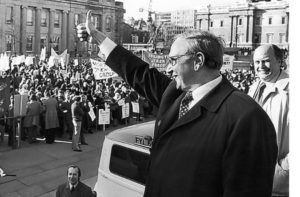If this week’s TUC Annual Congress has so far passed you by, you aren’t alone. It probably hasn’t registered with most of Britain’s six million trade union members either.
There was a time when the annual gathering of Britain’s trade unions was seen as a key event in the political calendar. Labour correspondents (remember them?) would devote vast column inches to the goings-on inside the conference hall.

Images of gnarled old union bruisers holding forth at the rostrum would be beamed live into the nation’s living rooms via the BBC. Leaders of the movement would be sent up by Mike Yarwood on prime time TV. The names Jack Jones and Hugh Scanlon – the ‘terrible twins’ – were known in every household.
Then came the 1980s. Weakened by the perfect storm of Margaret Thatcher’s anti-union laws and deindustrialisation, trade unions saw their influence decrease and membership numbers decline. The movement has never fully recovered.
But it has to be said that some unions – and in particular the TUC itself – have hardly helped themselves. In contrast to days gone by, unions are absent from large chunks of private industry and seem to have no strategy to put that right, seemingly content to stay rooted in their public sector comfort zone. The ideology that drives much of the movement these days is one rooted in the identity politics and liberal cosmopolitanism of the metropolitan middle-classes – something far removed from the lives of most ordinary workers. Witness, for example, the open horror displayed by much of the movement at the decision of millions of workers to vote to leave the EU.
Trade unions were once part of the lifeblood of our working-class heartlands. Now, the movement is seen as having little relevance in many of these communities.
The real tragedy is that at a time when unions are needed more than ever – such as to offer support and solidarity to those suffering the effects of austerity, or working in the gig economy or on zero hours’ contracts – the Annual Congress of the TUC is little more than a sideshow. And no-one should take any solace in that.










Join the discussion
Join like minded readers that support our journalism by becoming a paid subscriber
To join the discussion in the comments, become a paid subscriber.
Join like minded readers that support our journalism, read unlimited articles and enjoy other subscriber-only benefits.
Subscribe